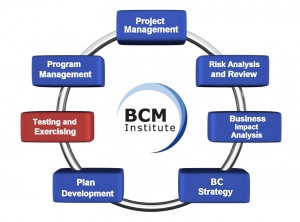Exercise
2. Process to train for, assess, practice, and improve organisational performance.

Notes (1): Exercises and can be used for validating policies, plans, procedures, training, equipment, and inter-organizational agreements; clarifying and training personnel in roles and responsibilities; improving inter-organizational coordination and communications; identifying gaps in resources; improving individual performance; and identifying opportunities for improvement, and controlled opportunity to practice improvisation.
Notes (2): A test is a unique and particular type of exercise, which incorporates an expectation of a pass or fail element within the planned goal or objectives. ([SOURCE: ISO 22300])

(Source: ISO 22390:2011 - Societal Security - Guidelines for Exercises and Testing) - clause 3.5
3. Controlled activity to train for, assess, practice, and improve business continuity performance.
(Source: AE/HSC/NCEMA 7000:2021)
4. Activity in which the business continuity plan(s) is rehearsed in part or in whole to ensure that the plan(s) contains the appropriate information and produces the desired result when put into effect.
(Source: British Standard BS25999-1:2006 Code of Practice for Business Continuity Management)
5. An announced or unannounced execution of business continuity plans intended to implement existing plans and/or highlight the need for additional plan development. A way of testing part of a Business Continuity Plan. An exercise may involve invoking Business Continuity procedures but is more likely to affect the simulation of a Business Continuity E/I/C in which participants role-play to assess what issues may arise, before an actual invocation.
(Source: Business Continuity Institute - BCI)
6. An activity that is performed to train and condition team members and to improve their performance in executing the BC Plan. It also serves to highlight the operation and effectiveness of the BC Plan to improve the BC Plan.
(Source: Singapore Standard 540 - SS 540:2008)
7. An activity performed for the purpose of training and conditioning team members and personnel in appropriate crisis responses with the goal of achieving maximum performance.
(Source: ASIS International - ASIS International)
8. A people-focused activity designed to execute Business Continuity Plans and evaluate the individual and/or organisation performance against approved standards or objectives. Exercises can be announced or unannounced and are performed to train and condition team members and validate the Business Continuity Plan. Exercise results identify plan gaps and limitations and are used to improve and revise the Business Continuity Plans.
(Source: ENISA - the European Network and Information Security Agency. BCM & Resilience Glossary)


